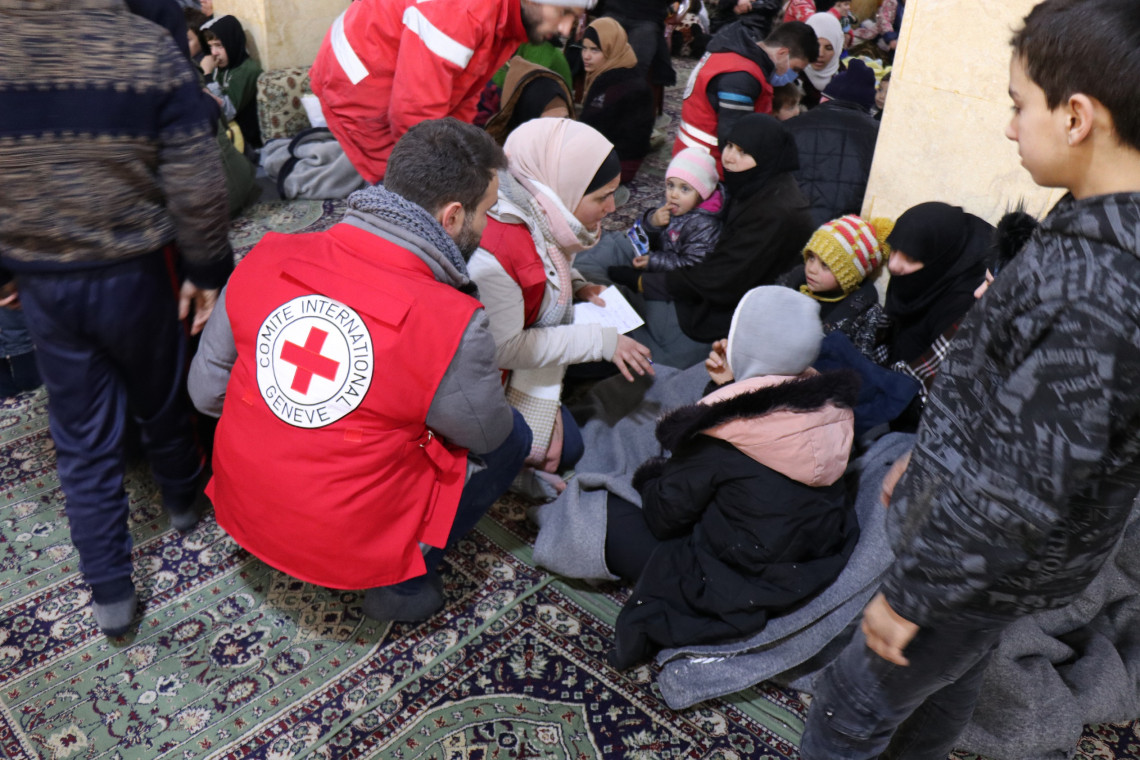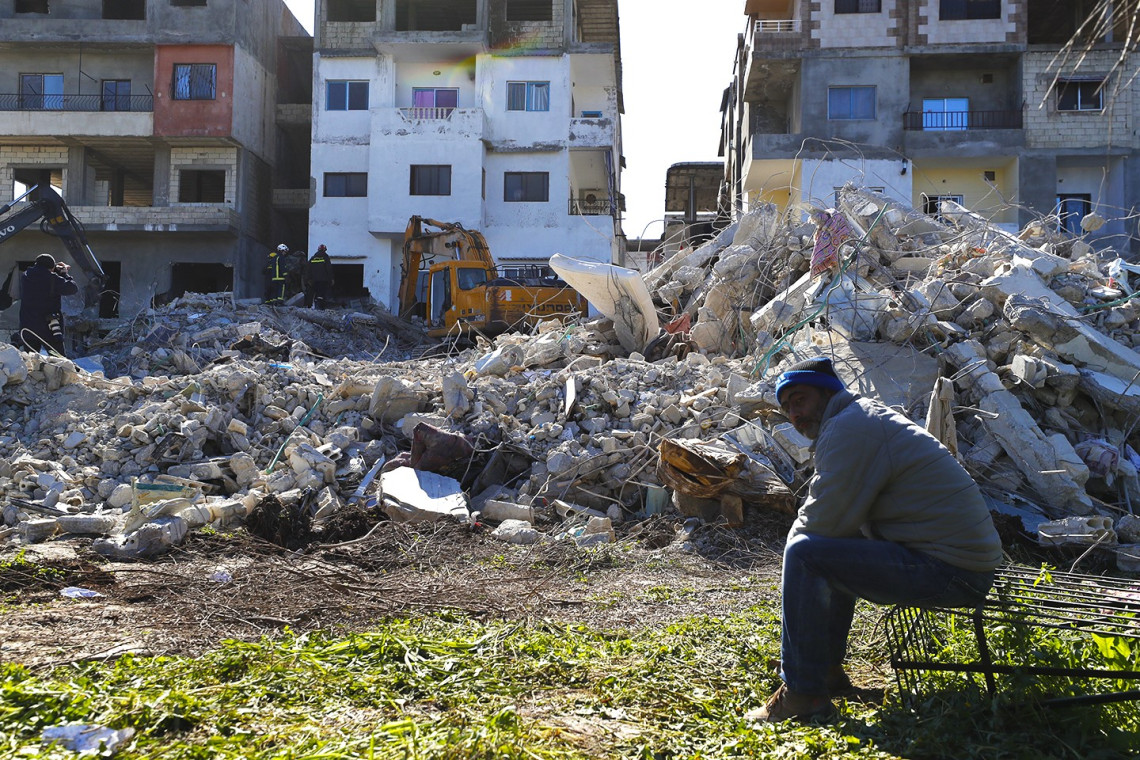No words can describe the sight of families – most of whom displaced more than once – who had to leave their homes in the freezing cold to take refuge in unsafe streets in the middle of the night.
Region battered by war
In northwest Syria, the quake hit a region already battered by 12 years of conflict, worsening the humanitarian crisis. Today, an estimated 90 percent of the 4.6 million people in north-west Syria are reliant on humanitarian assistance.
Even before the quakes struck, more than half of health facilities had been destroyed, whilst the conflict in Syria has made essentials like food, medicines and fuel, unaffordable for many.
Recently, a deadly cholera outbreak infected more than 85,000 people who don't have access to essential care or services. The country's water supply has been reduced by between 30% and 40%.
The conflict has also forced many families – more than half of the population – to flee their homes. Many have been struggling to survive in makeshift camps, enduring miserable living conditions.
Following the quakes, even those who had a permanent home have nowhere to shelter.
A water system struggling to cope
Aleppo's water system – which is so old that spare parts are no longer available for it – has come under increasing pressure, first from 12 years of conflict and now the earthquake. After losing their homes in the earthquake, more people today are relying on the same system to meet their water needs.
Direct damage to essential parts of the infrastructure reduced the system's efficiency and raised the risk that contaminated water could pollute the supply.
Additionally, many elevated water tanks on the roofs of houses were destroyed by the earthquake, leading to further stress on the system. Parts of the city's sewage system, which was already heavily damaged during the conflict, collapsed, exacerbating the needs in a region already struggling to cope with the effects of more than a decade of conflict.
"The possibility of devastating public health consequences as a knock-on effect from the earthquake is frighteningly high. A new public health emergency such as the spread of infectious diseases would be a disaster for the region," said Fabrizio Carboni, the regional director for the Near and Middle East for the International Committee of the Red Cross (ICRC).
Access to safe drinking water is a challenge affecting millions of people across Syria. Before 2010, 98% of people in cities and 92% of people in rural communities had reliable access to safe water. Today, only 50% of water and sanitation systems function properly across Syria.

Response by the ICRC
We have been providing life-saving support to people in Syria since 1967 and have stepped up our response in light of the growing and urgent humanitarian needs in northwest Syria following the deadly earthquake. We have worked in partnership with the Turkish Red Crescent Society and the Syrian Arab Red Crescent (SARC) whose volunteers are the first responders but also victims themselves.
Since the earthquakes struck, the ICRC, in partnership with the Syrian Arab Red Crescent (SARC), has:
Provided essential relief items to affected families, including:
- 32,096 mattresses and 47,063 blankets
- 23,995 canned food parcels
- 58,533 hygiene kits
Provided health care to 482,500 people and surgical consumables sufficient to treat 16,250 patients to hospitals in Aleppo, Hama and Lattakia.
Provided 35,000 cubic meters of water and 165,000 water bottles to more than 20,200 people.
Rehabilitated 42 facilities, most of which are schools to be used as shelters for 14,697 displaced people.
Provided mental health support and basic psychosocial care to help 982 affected people.
Building the capacity of the national society for their Restoring Family Links activities and supporting their response for the families separated due to the earthquake.
HEALTH CARE
The ICRC supported SARC and the MoH as follows:
- Provided health care to 482,500 people by distributing 48 primary health care kits, Insulin, 600 liter of chronic non communicable diseases Medication.
- Provided medical supplies and surgical consumables sufficient to treat 16,250 patients to hospitals in Aleppo, Hama and Lattakia.
- Provided mental health sessions to help 982 people to deal with the psychological impacts of the disaster and the conflict, through MHPSS Help the Helper Group Sessions, MHPSS Group Sessions on Self-care, and MHPSS IEC Materials.
- Supported healthcare and scaling up physical rehabilitation services for 5,900 people with disabilities, through providing Fracture Plastering Materials, and Mobility Aid Devices.
- The ICRC kept a close contact with all Forensic Service providers in the affected areas, and donated 1,300 body bags to Aleppo forensic center, Jableh hospital and Lattakia national hospital. In addition to 300 coverall, 20,000 surgical gloves, 1,000 masks, 200 hand disinfection gel and 52 detergents to Aleppo forensic center.
DAILY ESSENTIALS AND RESTORING LIVELIHOODS
The ICRC's ECOSEC teams collaborated with SARC to provide essential relief items to at least 10,000 affected families residing in the collective centers as follows:
- Distributed 32,096 mattresses, and 47,063 blankets to affected people.
- Provided 11,068 kitchen sets and 26,840 solar lamps.
- Distributed 23,995 canned food parcels, with an additional 17,150 cups of tea to help cope with cold temperatures.
- Distributed 58,533 hygiene kits, with an additional 1,000 kits customized to women.
WATER AND HABITAT
The ICRC collaborated with SARC to ensure access to clean water and improve living conditions for affected people as we:
- Made urgent repairs to Al-Sen dam, guaranteeing continuous water supply to 1.9 million people in Tartous and Lattakia governorates.
- Provided 35,000 cubic meters of water and 165,000 water bottles to more than 20,200 affected people.
- Rehabilitated 42 facilities, most of which are schools to be used as shelters for 14,697 internally displaced people.
- Provided 5,000 bleach materials to Aleppo IDP centers, and three tents to SARC teams in Lattakia & Aleppo.
- Rented five heavy machinery included support truck to help in rescuing people and removing the rubble in Aleppo city.
- Improved access to clean water through the provision of spare parts, water quality testers, aqua tabs, electrical cables, and pumps, to Hama water.
- Supported 5,200 people in Aleppo Central Prison after the rehabilitation of damages due to the earthquake.
- Distributed 26 transformers with accessories, to restore power supply to 49,300 people in the earthquake-affected areas.
- Provided one generator, to the water board in Lattakia ensuring access to clean water to 1,000 people.
- Provided three generators to bakeries to support 300,000 people in Aleppo, Hama, Lattakia and Tartus.
- Provided two water tanks to Jableh hospital.
- Repaired the generator of Lattakia National hospital.
PROMOTING SAFER BEHAVIOUR IN WEAPON CONTAMINATED AREAS
As part of the earthquake response, the ICRC collaborated with SARC to raise awareness about both weapon contamination and earthquake-related risks, including:
- Held a total of 1,284 Risk Awareness and Safer Behaviour (RASB) sessions tailored to both weapon-contamination and earthquake-related risks, covering 17,233 individuals.
- Distributed more than 8,000 RASB materials, and 20 posters were put in the IDP centers where weapon contamination is a concern.
- Completed three desk assessments with recommendations for field staff responding to earthquake-related needs in weapon-contaminated areas.
- Completed five field visits and one non-technical survey as part of weapon contamination field assessment. Based on the findings, the ICRC liaised with the authorities and removed the hazard.
Families in Syria need you
Today your donation can make a difference for the most vulnerable.
DONATE NOW
Ensuring a sustainable response
Our emergency response will not stop in the next few months. We will continue our efforts to help vulnerable people in Syria sustain their lives for the future, through the following actions:
- Distributing cash and providing long-term livelihood support.
- Supporting health care and scaling-up physical rehabilitation services for people with disabilities.
- Repairing damaged schools to ensure children have access to education.
How you can help
The people of Syria need help now. You can make a difference to the most vulnerable. Your support can provide life-saving essentials and help people piece their lives back together.
Get involved
Donate now

